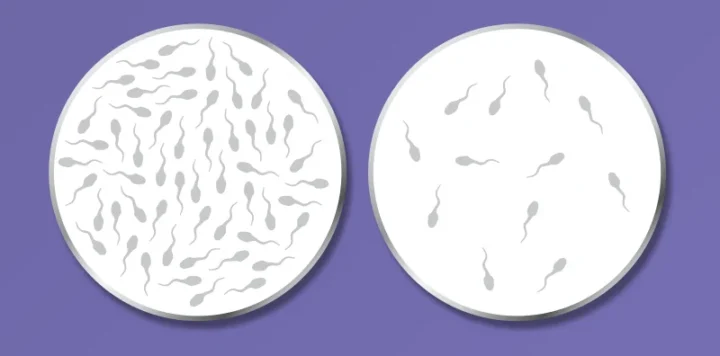
If you’re looking for safe Remedies for Low Sperm Count, this Ayurvedic and evidence-aware guide offers practical steps you can start at home. These remedies for low sperm count focus on lifestyle, diet, targeted herbs, yoga and simple tests — and they explain when to seek professional help. For personalised care, consult an expert (link below).
The problem
Low sperm count (oligozoospermia) reduces the number of sperm in an ejaculate and can make conception harder. The immediate problem is reduced fertility; the deeper problems often include hormonal imbalance, poor sperm production due to heat, oxidative stress, poor diet, alcohol/tobacco, infections, varicocele or certain medications. Effective Remedies for Low Sperm Count must combine symptom-focused steps (improve semen quality) with medical evaluation to find and treat underlying causes.
How to use these remedies for low sperm count
Start with 2–3 changes you can maintain for 3 months (sperm life cycle ≈ 72 days). Track progress with repeat semen analysis and coordinate herbs/supplements with your doctor. Stop anything that causes side effects and consult before combining with prescription medicines.
1) Get tested first — semen analysis and basic labs
Why: Treatment must be guided by tests.
What to do: Get a semen analysis, and basic hormone tests (FSH, LH, testosterone, prolactin, TSH) plus infection screening if advised. Share results with your practitioner.
2) Improve sleep and reduce stress
Why: Poor sleep and chronic stress lower testosterone and sperm quality.
How: Aim for 7–8 hours, regular sleep times, daily short meditation or breathing (Anulom Vilom, Bhramari) to reduce cortisol.
3) Eat a nutrient-rich, antioxidant diet
Why: Sperm need antioxidants and building blocks (zinc, selenium, folate, vitamin C, vitamin D).
What to eat: Eggs, ragi/millets, leafy greens, nuts (walnuts, almonds), pumpkin seeds, citrus fruits, berries, fish (if non-veg), and plenty of vegetables. Limit processed foods and excess sugar.
4) Maintain healthy weight and exercise sensibly
Why: Obesity and low activity both harm hormones and sperm.
How: Do moderate aerobic exercise and 2 sessions of resistance training per week. Avoid excessive endurance training which may lower testosterone.
5) Avoid heat & tight clothing — simple but crucial remedies for low sperm count
Why: Testicular temperature affects sperm production.
How: Avoid tight underwear, hot baths, saunas, and keeping laptops on the lap for long periods.
6) Stop smoking, limit alcohol and recreational drugs
Why: Tobacco, heavy alcohol and recreational drugs reduce sperm count and motility.
How: Quit smoking, limit alcohol to minimal levels, and avoid recreational substances.
7) Targeted Ayurvedic herbs & rasayanas (use under guidance)
Why: Classical herbs support reproductive tissues, ojas and vitality. Use standardised products and practitioner advice. Common options include:
- Ashwagandha — adaptogen; some studies show improvements in sperm count and motility.
- Shilajit (resin) — traditional rasayana; may support stamina and reproductive health. (Buy authentic Vedic Upchar Shilajit here: https://vedicupchar.com/product/vedic-shilajit/).
- Safed Musli, Gokshura (Tribulus), Kapikacchu (Mucuna), Kaunch Beej — used in classical formulations to support male reproductive health.
Always consult an Ayurvedic doctor for correct formulations and doses.
8) Key micronutrients & supplements (lab-guided)
Why: Deficiencies of zinc, selenium, vitamin D and folate correlate with poor semen parameters.
How: Test levels where possible; consider supplements from reputable brands if deficient — do not self-prescribe high doses without testing.
9) Gentle pelvic exercises & Kegel for support
Why: Pelvic floor strength can aid ejaculation control and sexual function.
How: Learn Kegel exercises and pelvic stretches; combine with core strengthening under physiotherapist guidance if needed.
10) Treat infections, varicocele or medication causes promptly
Why: Treatable medical issues (e.g., genital infections, varicocele) can improve sperm count once corrected.
How: Share semen test results with a urologist/andrologist and consider coordinated care with an Ayurvedic practitioner.

Practical 3-month plan
First Month: Tests (semen + hormones), stop smoking/alcohol, start antioxidant diet, 7–8 hrs sleep, short daily pranayama.
Second Month : Add practitioner-recommended herbs (e.g., ashwagandha or a bespoke tonic), resistance training twice weekly, avoid heat exposure.
Third Month : Repeat semen analysis, reassess supplements/herbs, consider further medical evaluation (urology) if no improvement.
Safety notes & realistic expectations
- Sperm production takes ~70–90 days — expect gradual changes.
- Avoid unregulated “quick fix” supplements; use standardised products and check third-party testing if buying online.
- If you have severe symptoms, infections, pain, or sudden changes, see a urologist promptly.
- Herbs can interact with medicines — discuss with both your medical doctor and Ayurvedic practitioner.
When to get a consultation
If you have abnormal semen reports, difficulty conceiving after 6–12 months, recurrent infections, low libido, or other reproductive concerns — get expert help. For a personalised Remedies for Low Sperm Count plan (tests review, herbal protocol, diet and lifestyle plan), get a consultation from Vedic Upchar:
👉 https://vedicupchar.com/doctor-consultation.
Our practitioners can coordinate tests and create a safe, evidence-aware Ayurvedic plan.
Quick checklist — do these every day
- Sleep 7–8 hours and manage stress.
- Eat antioxidant-rich meals and seeds/nuts daily.
- Avoid tight clothes, hot baths and laptop on lap.
- Stop smoking and limit alcohol.
- Follow practitioner-prescribed herbs and retest after 3 months.